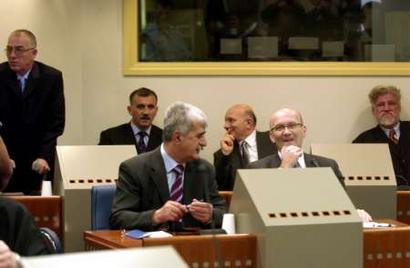Home
IS HOSPITAL A LEGITIMATE TARGET?
A member of the Spanish Battalion in the UN peace-keeping force testifies about the Croat-Muslim conflict in Mostar at the trial of former Bosnian Croat leaders. One of the questions for him was: is a hospital surrounded by enemy mortar positions a legitimate target?
 Jadranko Prlic and Bruno Stojic in the front row and Slobodan Praljak, Milivoj Petkovic, Valentin Coric and Berislav Pusic in the back row
Jadranko Prlic and Bruno Stojic in the front row and Slobodan Praljak, Milivoj Petkovic, Valentin Coric and Berislav Pusic in the back row At the trial of former Herceg Bosna leaders, the prosecution called yet another member of the Spanish Battalion, who testified under a pseudonym and with image distortion about the Croat-Muslim conflict in Mostar. In the examination-in-chief, he confirmed a number of reports filed by the Spanish Battalion about the shelling, sniping and humanitarian situation in East Mostar. He was there from December 1993 until the end of the conflict. He described the situation in East Mostar as ‘high-risk’ because of frequent shelling and serious humanitarian situation.
When one of the judges asked him why ‘no one thought’ to deploy UNPROFOR soldiers along the confrontation line, between the warring factions, the witness explained that the peace-keeping mission in BH had a very clear mandate: it was there ‘to observe and to mediate’. SPABAT troops ‘counted the shells’ fired by both sides, secured humanitarian aid convoys and mediated between the warring factions in order to get them to agree to a ceasefire. Those ceasefires had virtually no effect until the conflict ended.
Only Slobodan Praljak’s defense wanted to cross-examine the witness, who confirmed that ‘in some instances’ SPABAT intervened because of BH Army mortar positions close to the war hospital. After Praljak asked a number of questions about the ‘legitimate shelling of military targets’, Swiss judge Trechsel intervened, noting that the accused were not allowed to cross-examine witnesses on legal issues.
However, since the presiding judge Antonetti wanted to know ‘if the army has the right to fire on a hospital if it is surrounded by a number of enemy mortar positions’, the witness was given a chance to answer. After noting that all armies should comply with international law, the witness said it was ‘up to the commanders to take certain actions, and up to the courts to rule whether it is right or not’.
Linked Reports
- Case : Prlic et al.
- 2007-10-01 DEATH OF A SPANISH LIEUTENANT
- 2007-04-16 PRLIC: WE HAVE ALREADY BEEN JUDGED
- 2007-04-05 PRALJAK: TUDJMAN WAS A FOOL
- 2007-10-09 HERCEG BOSNA’S BIG SHOTS AND SMALL FRY
- 2007-10-15 HOW PRLIC DREW THE DIVISION OF BOSNIA HERZEGOVINA
- 2007-10-16 PRLIC’S LAWYER ‘AND HIS TWISTED HUMOR’
